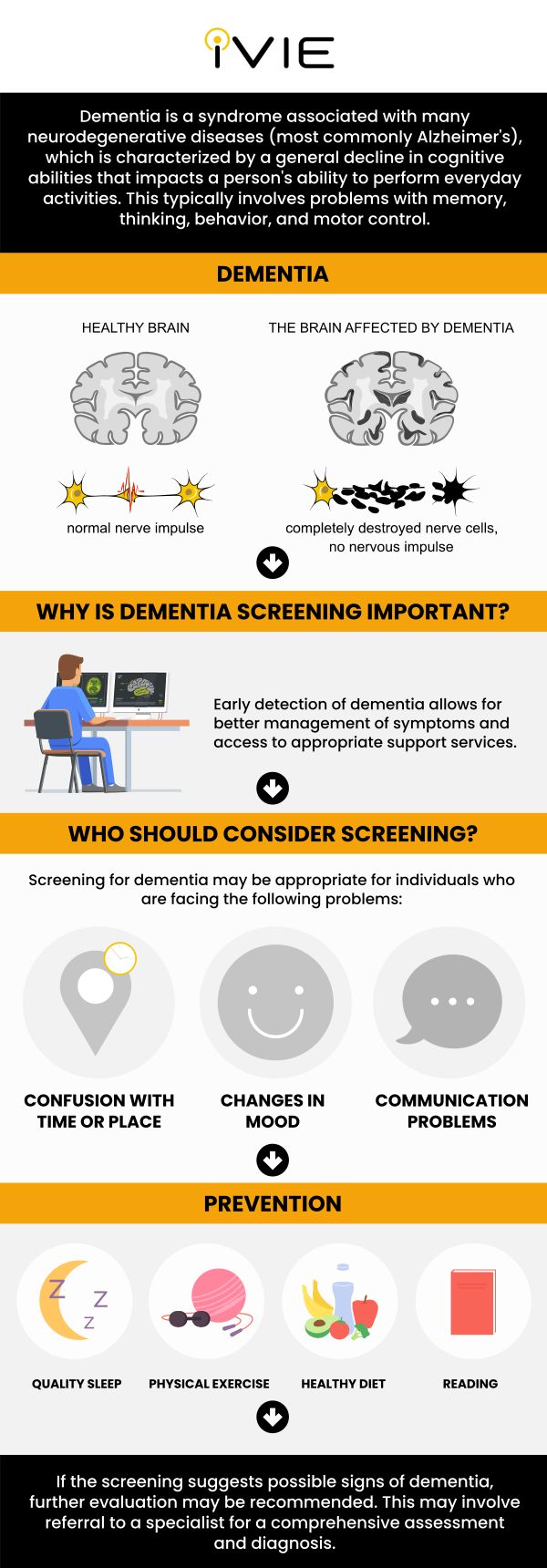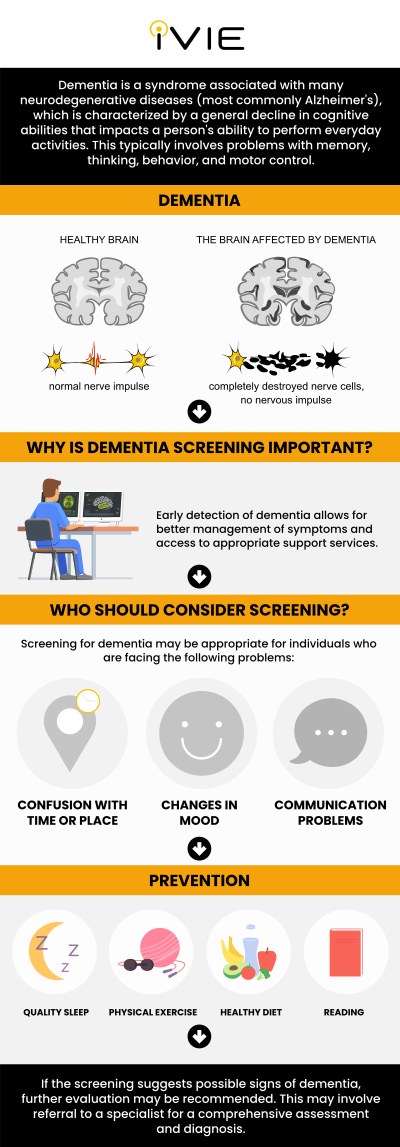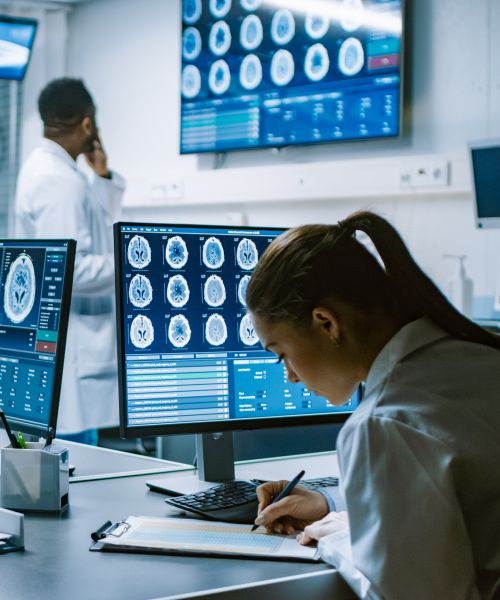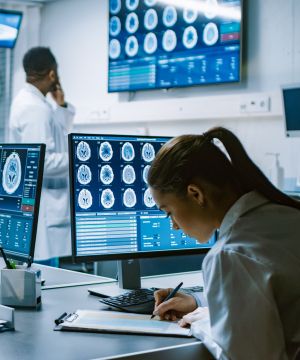How to Spot the Early Signs of Dementia: Key Symptoms to Watch For
Spotting the early signs of dementia can significantly impact the effectiveness of treatment and care. Dr. Kourosh Naini, at iVIE in Culver City, Los Angeles, CA, emphasizes the importance of monitoring subtle changes in cognitive function. Common early symptoms to watch for include frequent memory lapses, difficulty with problem-solving or familiar tasks, and challenges in communication. Other indicators may involve changes in mood, confusion about time or place, and decreased ability to make decisions. For more information, contact us today or book an appointment online. We are located at 11600 Washington Pl Suite 104A, Culver City, CA 90066.


Table of Contents:
How does dementia affect daily functioning in its early stages?
Can early symptoms of dementia be mistaken for normal aging?
Can an MRI detect dementia before noticeable symptoms appear?
How can an MRI differentiate between dementia and other cognitive disorders?
One of the primary areas impacted by early dementia is memory, especially short-term memory. At iVIE, advanced imaging techniques can help detect changes in brain structure that correlate with memory decline. By identifying these changes early, healthcare providers can develop more effective treatment plans to support memory retention and improve quality of life.
Communication difficulties, another early sign of dementia, can also be better understood through detailed brain imaging. Our technology allows for a deeper analysis of the areas of the brain responsible for language and communication, aiding in distinguishing between normal aging and more severe cognitive impairments.
Cognitive functions such as problem-solving and planning may decline, affecting an individual’s ability to perform everyday tasks. Imaging can reveal patterns of brain activity and structural changes that correspond to these cognitive declines, providing essential information for tailoring interventions that help maintain independence and support daily living activities.
Mood and personality changes, including mood swings and apathy, can be distressing for both the individual and their loved ones. Our imaging services can assist in identifying neurological changes that underlie these emotional shifts, facilitating more accurate diagnoses and enabling targeted treatments to manage these symptoms effectively.
Lastly, spatial awareness and orientation issues are common in early-stage dementia. Advanced imaging can help predict and monitor these changes, leading to personalized strategies that ensure patient safety and adapt their environment to reduce risks.
iVIE’s cutting-edge imaging services play a vital role in the early diagnosis and management of dementia. By providing detailed insights into the brain’s structure and function, our healthcare providers support in development of comprehensive care plans that address the unique challenges faced by individuals with dementia, helping to maintain their independence and quality of life for as long as possible.
For instance, while age-related memory lapses such as occasionally forgetting names or appointments are common, early dementia symptoms are more severe and disruptive to daily life. Patients may frequently forget important dates, repeatedly ask for the same information, or struggle with everyday tasks like managing finances or following familiar recipes. Diagnostic imaging can provide valuable insights into these cognitive changes, aiding in the differentiation between normal aging and dementia.
Moreover, dementia may present with spatial and visual difficulties, impacting activities such as driving. At iVIE, our team can help assess these changes by examining brain areas involved in visual processing and spatial awareness. Similarly, changes in mood and personality, such as increased confusion or social withdrawal, might also signal early dementia. These symptoms, often subtle and easily mistaken for stress or fatigue, can be further evaluated through comprehensive imaging studies.
Early detection is paramount in dementia care performed by dementia screening. By collaborating with healthcare providers, we can support the early diagnosis and monitoring of dementia, offering patients and their families a clearer understanding of the condition. This collaboration can lead to timely interventions, potentially slowing the progression of the disease and improving quality of life.
In summary, our expertise in diagnostic imaging positions it as a valuable partner in the fight against dementia. By facilitating early and accurate diagnosis of dementia, we can empower individuals and caregivers to take informed, proactive steps in managing this challenging condition.
Although MRI cannot diagnose dementia in its earliest stages before symptoms manifest, it can reveal structural changes in the brain that are often associated with the onset of dementia-related illnesses. For instance, patterns of brain atrophy, particularly in the hippocampus and regions linked to memory and cognitive functions, are indicative of early Alzheimer’s and other forms of dementia. Detecting these changes early enables clinicians at iVIE to assess the likelihood of future cognitive decline, paving the way for timely interventions and management strategies.
At iVIE, we recognize that MRI is one part of a comprehensive diagnostic approach. While brain changes can vary between individuals due to factors like age, genetics, and other health conditions, our team combines MRI findings with other diagnostic tools. These include cognitive assessments, genetic screenings, and clinical evaluations to provide a thorough and personalized evaluation of each patient.
By leveraging the capabilities of MRI alongside other diagnostic modalities, our team is committed to offering cutting-edge care that enhances early detection and improves outcomes for patients at risk of dementia. Our ongoing commitment to research and the adoption of advanced imaging technologies ensures that we remain at the forefront of diagnostic excellence, providing valuable insights into brain health and supporting proactive management of cognitive decline.
In the diagnosis of Alzheimer’s disease, the most prevalent form of dementia, MRI scans at IiVIE can reveal significant atrophy in the hippocampus and medial temporal lobes. This distinct pattern is crucial for distinguishing Alzheimer’s from other dementias. For example, frontotemporal dementia often presents with atrophy in the frontal and temporal lobes, a pattern that our MRI technology can differentiate from Alzheimer’s. Additionally, our MRI scans can identify the multiple small strokes or white matter changes associated with vascular dementia, distinguishing it from both Alzheimer’s and frontotemporal dementia.
Beyond dementia, our MRI services are instrumental in differentiating between cognitive disorders such as mild cognitive impairment (MCI) and normal pressure hydrocephalus (NPH). While MCI may show mild atrophy on MRI, this is typically less severe than in Alzheimer’s disease. Our MRI technology can also identify the enlarged ventricles characteristic of NPH, with minimal surrounding brain tissue atrophy, providing a clear diagnostic advantage.
iVIE comprehensive MRI scans can help exclude other potential causes of cognitive impairment, such as brain tumors, subdural hematomas, or chronic infections, by offering a detailed view of the brain’s structure. This capability enables our clinicians to make more accurate diagnoses, tailor management strategies effectively, and offer patients and their families a clearer understanding of their condition. With our state-of-the-art MRI technology, we are committed to providing the highest quality diagnostic services to support the effective differentiation and management of dementia and other cognitive disorders.
Early detection of dementia can make a significant difference in managing the condition and improving the quality of life. If you notice any concerning symptoms, it’s important to seek professional guidance as soon as possible. At iVIE, Dr. Kourosh Naini and our expert team are committed to helping you understand and address early signs of dementia. For more information, contact us today or book an appointment online. We are located at 11600 Washington Pl Suite 104A, Culver City, CA 90066. We serve patients from Culver City, Los Angeles CA, Downtown LA, Beverly Hills CA, Marina del Rey CA, Venice CA, Santa Monica CA, and surrounding areas.
Check Out Our 5 Star Reviews



Additional Services You May Need
▸ Dementia Screening
▸ Aneurysm Screening
▸ Spine MRI
▸ Whole Body MRI Screening
▸ MRI Brain Screening
▸ Brain PET
▸ Work/Sport Spine Injury Diagnosis
▸ Work/Sport Brain Injury Diagnosis
▸ Whole Body PET For Cancer
▸ MRA Brain Screening


